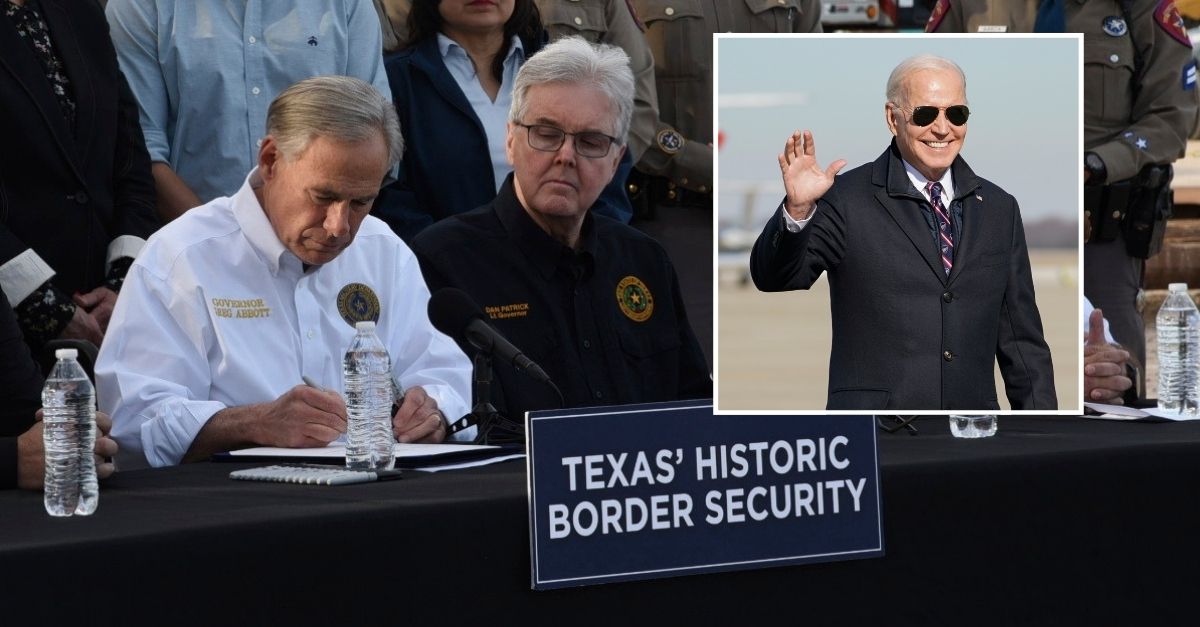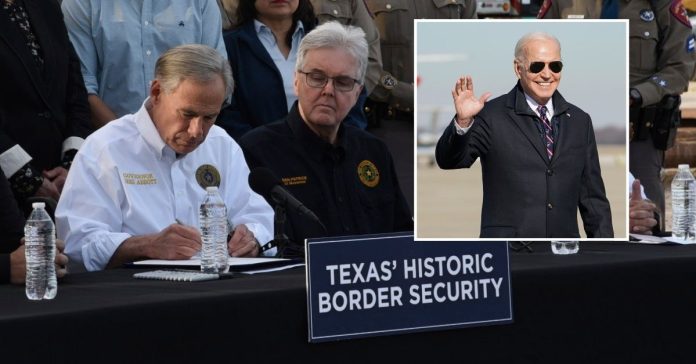
Main: Texas Gov. Greg Abbott signs three bills into law at a border wall construction site in Brownsville, Texas, Dec. 18, 2023, that will broaden his border security plans and add funding for more infrastructure to deter illegal immigration. (AP Photo/Valerie Gonzalez, File); Inset: President Joe Biden walks to board Air Force One at Andrews Air Force Base, Md., Friday, Jan. 5, 2024, (AP Photo/Stephanie Scarbrough)
In a widely anticipated lawsuit, the Biden administration has challenged a new Texas law that allows cops in the Lone Star State to arrest and prosecute illegal border crossers.
The law, SB 4, is part of Republican Gov. Greg Abbott’s “Operation Lone Star,” and is expected to reach the U.S. Supreme Court. Abbott’s “Operation Lone Star” initiative also includes increased funding for border security efforts, the installation of razor wire at the U.S.-Mexico border, and the creation of a barrier of floating buoys in the Rio Grande.
Associate Attorney General of the United States Vanita Gupta called SB 4 “clearly unconstitutional” in a statement Wednesday.
SB 4 allows Texas law enforcement to arrest anyone even suspected of crossing the U.S.-Mexico border without legal authorization and charge them with crimes ranging from misdemeanors to felonies. The law permits Texas not only to prosecute offenders but also to punish them with jail time or return them to Mexico.
Abbott said in November that he “look[ed] forward to signing Senate Bill 4,” a measure that has been touted by Texas Lt. Gov. Dan Patrick as “the strongest border security bill Texas has ever passed.”
The 18-page complaint, filed in federal district court in Austin, did not focus on the practical ramifications of the law (which opponents say will make Texas communities generally less safe), but instead around the federal government’s exclusive authority to regulate immigration under the United States Constitution and Supreme Court precedent.
“Texas cannot run its own immigration system,” the complaint said. The lawsuit seeks a declaratory judgment before the law takes effect on March 5.
The Biden administration asserted that, “federal law already imposes a comprehensive removal framework,” and that the new Texas statute “will interfere with federal immigration operations.”
“The United States must speak with one voice in immigration matters,” argued the Department of Justice in the filing.
The legal basis upon which the federal government based its claims for relief rests on both preemption and the foreign commerce clause. Not only does Texas’ law directly conflict with existing federal law, but it also creates the risk of conflict with foreign governments, said the filing.
The Supreme Court has considered states’ authority to make their own laws punishing illegal immigration in the past. Arizona’s SB 1070 was struck down by the Supreme Court in 2012 for conflicting with the federal government’s preemptive power over immigration.
The Arizona statute, like Texas’ SB 4, authorized local law enforcement to arrest people on “reasonable suspicion” of illegal border crossing. The justices ruled 5-3 against Arizona on the grounds that the state may not create its own policies that undermine federal law. In 2012, the makeup of the Court was markedly different from what it is today. Justice Anthony Kennedy penned a majority decision joined by Chief Justice John Roberts and Justices Ruth Bader Ginsburg, Stephen Breyer, and Sonia Sotomayor. Of that five-member majority, only Roberts and Sotomayor remain on the Court.
Justices Antonin Scalia, Clarence Thomas, and Samuel Alito each penned a solo dissent in the Arizona case. Though Scalia’s time on the Court ended with his death in 2016, conservative Justices Neil Gorsuch, Brett Kavanaugh, and Amy Coney Barrett might well sign on to a pro-Texas ruling.
Justice Elena Kagan recused herself from the Arizona case because, before her time as a justice, she defended the Obama administration’s position in the case in her role as solicitor general.
You can read the full complaint here.
Have a tip we should know? [email protected]

